

Attention Deficit Hyperactivity Disorder (ADHD): Controversy, Developmental Mechanisms, and Multiple Levels of Analysis. - PubMed - NCBI. Could School Testing Be Driving ADHD? All it took was a map to convince health economists Stephen Hinshaw and Richard Scheffler that it must be some kind of policy issue driving a recent explosion in cases of ADHD.
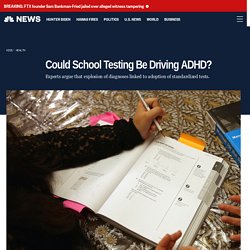
And a convenient natural experiment — in the form of the federal government’s No Child Left Behind — provided the answer, the two experts argue in a new book. It’s school testing, they say. “When you look at that, you get the closest thing there is to a smoking gun,” says Richard Scheffler, of the University of California Berkeley who co-authored the book, “The ADHD Explosion”, which was just published this month. "You get the closest thing there is to a smoking gun. " But it’s not necessarily a bad thing, the authors say, if children are being diagnosed properly, and if they’re getting the right treatments. National University Library System. Chemical & Engineering News: Top Pharmaceuticals: Ritalin. Purpose Typical Stimulant Impulsive, hyperactive, easily distracted, impatient.
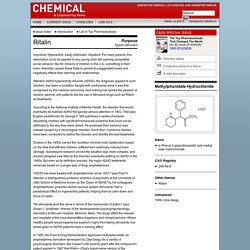
For many parents, this description could be applied to any young child still learning acceptable social behavior. But for millions of children in the U.S., something in their brain chemistry causes these traits to persist at exaggerated levels and negatively affects their learning and relationships. Attention deficit hyperactivity disorder (ADHD), the diagnosis applied to such children, has been a condition fraught with controversy since it was first recognized by the medical community. According to the National Institute of Mental Health, the disorder that would eventually be dubbed ADHD first gained serious attention in 1902.
Doctors in the 1950s named the condition minimal brain dysfunction based on the idea that affected children suffered from externally induced brain damage. Neuroscientifically Challenged. Is it really ADHD? Between fall 2011 and spring 2012, record numbers of Americans went to their pharmacies to fill prescriptions for Adderall, Ritalin and other stimulants, primarily to treat attention-deficit/hyperactivity disorder (ADHD), only to find the medications were sold out.
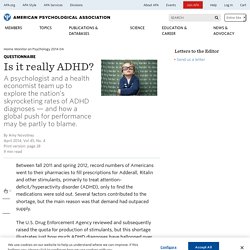
Several factors contributed to the shortage, but the main reason was that demand had outpaced supply. The U.S. Drug Enforcement Agency reviewed and subsequently raised the quota for production of stimulants, but this shortage illustrates just how much ADHD diagnoses have ballooned over the past decade. In 2003, 7.8 percent of 4- to 17-year-olds had received a diagnosis of ADHD, according to data from the National Survey of Children's Health, sponsored by the Centers for Disease Control and Prevention. By 2007, that number had jumped to 9.5 percent, an increase of 22 percent. The CDC also found that over two-thirds of children and teens who have been diagnosed with ADHD take medication for it. Now we're scratching our heads.
Shire's ADHD Drugs Face Resistance in a Skeptical Europe - Businessweek. Not that long ago, if Junior didn’t pay attention in his classroom, he might be sent to the principal’s office or have his parents called in to discuss his “bad” behavior.

Today such kids increasingly are being screened for attention deficit hyperactivity disorder, a condition for which diagnoses are soaring across the U.S. Characterized by inattention, overactivity, and impulsiveness, ADHD may afflict an estimated 10 percent of American kids, according to a survey by the Centers for Disease Control and Prevention (CDC), and some researchers link it to drug abuse and an increased likelihood of criminal convictions in adulthood. ADHD, Data and Statistics - NCBDDD. New Data: Medication and Behavior Treatment [Read summary( The data from a national sample of children with special health care needs, ages 4-17 years, collected in 2009-10, showed that most children with ADHD received either medication treatment or behavioral therapy; however, many were not receiving treatment as described in the best practice guidelines from 2011.
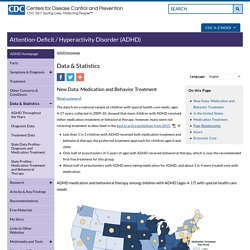
Attention-deficit hyperactivity disorder (ADHD): an updated review of the essential facts - Tarver - 2014 - Child: Care, Health and Development. Towards systems neuroscience of ADHD: A meta-analysis of 55 fMRI studies. Effects of stimulants on brain function in attention-deficit/hyperactivity disorder: a systematic review and meta-analysis. Reduced insular volume in attention deficit hyperactivity disorder. The Brain Insula: Function and Disease. Nature Reviews Neuroscience is a scientific journal dedicated to neuroscience topics that recently celebrated it’s ten year anniversary.

To commemorate the accomplishment, the most highly cited articles from each of the last 10 years was identified. This method provides a good proxy for the most important publication each year. The 2009 most cited article was Dr. A.D. Craig’s article entitled: “How do you feel—now? Dr. The insula has been long identified as a sensory region for the gut and body. The Dopamine Dilemma. Molecular Psychiatry - ADHD-associated dopamine transporter, latrophilin and neurofibromin share a dopamine-related locomotor signature in Drosophila. Our unclear understanding of ADHD. Attention-deficit hyperactivity disorder, or ADHD, has engendered a great deal of debate over the past several decades.
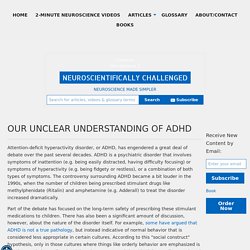
ADHD is a psychiatric disorder that involves symptoms of inattention (e.g. being easily distracted, having difficulty focusing) or symptoms of hyperactivity (e.g. being fidgety or restless), or a combination of both types of symptoms. The controversy surrounding ADHD became a bit louder in the 1990s, when the number of children being prescribed stimulant drugs like methylphenidate (Ritalin) and amphetamine (e.g. Adderall) to treat the disorder increased dramatically. Part of the debate has focused on the long-term safety of prescribing these stimulant medications to children. There has also been a significant amount of discussion, however, about the nature of the disorder itself. The Dopamine Mechanism- ADHD's Future » The Dopamine Mechanism. There is hope yet for the future of ADHD diagnosis.

The dopamine hypothesis for ADHD’s neurological mechanism is the most probable and studied theory. It is based on a malfunctioning or decreased functioning of the dopamine system in particular regions of the brain. Dopamine activity is essential to the motor and cognitive functioning of the brain and the malfunctioning of even a single part of this system causes a wide range of neurological symptoms (Coccaro et al. 2007). The dopamine hypothesis of ADHD, which is still being studied, is specifically based on the malfunctioning of the D4, D2, and other particular dopamine receptors in the brain in addition to abnormally low or high levels of dopamine in the brain in general (Shaw 2007). Science-2012-Duman-68-72.pdf.
PLOS Medicine: Serotonin and Depression: A Disconnect between the Advertisements and the Scientific Literature. Citation: Lacasse JR, Leo J (2005) Serotonin and Depression: A Disconnect between the Advertisements and the Scientific Literature.
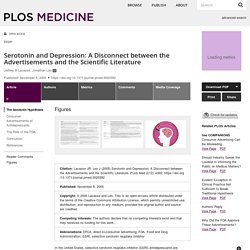
PLoS Med 2(12): e392. doi:10.1371/journal.pmed.0020392 Published: November 8, 2005 Copyright: © 2005 Lacasse and Leo. This is an open-access article distributed under the terms of the Creative Commons Attribution License, which permits unrestricted use, distribution, and reproduction in any medium, provided the original author and source are credited. Competing interests: The authors declare that no competing interests exist and that they received no funding for this work. McGovern Institute for Brain Research at MIT. Inside the adult ADHD brain Brain scans differentiate adults who have recovered from childhood ADHD and those whose difficulties linger. by Anne Trafton | June 10, 2014 About 11 percent of school-age children in the United States have been diagnosed with attention deficit hyperactivity disorder (ADHD).
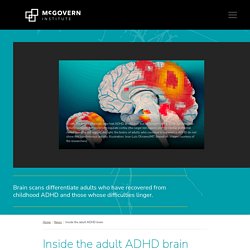
While many of these children eventually “outgrow” the disorder, some carry their difficulties into adulthood: About 10 million American adults are currently diagnosed with ADHD. In the first study to compare patterns of brain activity in adults who recovered from childhood ADHD and those who did not, MIT neuroscientists have discovered key differences in a brain communication network that is active when the brain is at wakeful rest and not focused on a particular task.
“The psychiatric guidelines for whether a person’s ADHD is persistent or remitted are based on lots of clinical studies and impressions. Executive Functions Impaired in ADD/ADHD. From more than 25 years of clinical interviews and research with children, adolescents and adults who have ADD/ADHD, Dr. Brown has developed an expanded model to describe the complex cognitive functions impaired in ADD/ADHD. This model describes executive functions, the cognitive management system of the human brain. Although the model shows six separate clusters, these functions continually work together, usually rapidly and unconsciously, to help each individual manage many tasks of daily life. Is it really ADHD? The Business Of Adhd. What role do the insurance companies and pharmaceutical companies play in the world of ADHD? . . . There's a suit going on right now in three states. It alleges that the major pharmaceutical company that makes Ritalin, the Novartis Company, along with the American Psychiatric Association, the main representatives of organized medicine in the ADHD movement, and the self-help group CHADD have conspired to dupe the American public into believing that there's such a thing as ADHD, and then thrust upon innocent children a potentially dangerous drug.
The suit alleges that there's a conspiracy. The neurobiological basis of ADHD. Conceptual and methodological challenges for neuroimaging studies of autistic spectrum disorders. The neurobiological basis of ADHD. 07aj0942.PDF.
Mechanism of action of methylphenidate: insig... [J Atten Disord. 2002] Are ADHD Medications Overprescribed? - WSJ. Parenting Interventions for ADHD: A Systemati... [J Atten Disord. 2014] Attention-Deficit / Hyperactivity Disorder (ADHD) - Neuropsychology - Children's National Medical Center. Condition/Treatment What is attention-deficit/hyperactivity disorder (ADHD)? ADHD, also called attention-deficit disorder, is a behavior disorder, usually first diagnosed in childhood. It is characterized by inattention, impulsivity, and, in some cases, hyperactivity. These symptoms usually occur together; however, one may occur without the other(s).
The symptoms of hyperactivity, when present, are almost always apparent by the age of 7 and may be apparent in very young preschoolers. ADHD Powerpoint Presentation. Attention-deficit/hyperactivity disorder (ADHD): Symptoms. Attention-deficit/hyperactivity disorder (ADHD) has been called attention-deficit disorder (ADD) in the past. But ADHD is now the preferred term because it describes both of the primary features of this condition: inattention and hyperactive-impulsive behavior.
Causes of Attention Deficit Disorder (ADHD) Table of Contents: As with all mental disorders, the exact cause of attention deficit disorder (ADHD) is unknown, so parents should not blame themselves for this problem. It is likely that many factors play a role in each case of ADHD, very little of which has to do with specific parenting or child rearing skills.
Inevitably, parents will ask themselves “What did I do to cause this?” Or “How could I have prevented it?” , but most of the evidence points to genetic factors, environmental facts or brain damage. Are stimulants overprescribed for youths... [Ann Clin Psychiatry. 2000. Is Ritalin Overprescribed - Is Ritalin Overprescribed.pdf. Topamax Information from Drugs. Attention Deficit Hyperactivity Disorders (ADHD) Homepage - NCBDDD. ADHD Diagnosis and TreatmentNew data on trends and age of diagnosis.Learn More » Children's Mental DisordersA Journey for Parents and Children Learn More » Medscape VideoADHD: Do parents know If Their Child Has Been Diagnosed? Learn More » Updated GuidelinesChildren can now be diagnosed and treated for ADHD from ages 4 to 18.Learn More » ADHD - A case of over diagnosis? : Dr. David A. Sousa at TEDxASB.
Understanding the Rise in ADHD Diagnoses: 11% of U.S. Children Are Affected. The rates of U.S. children affected by attention-deficit/hyperactivity disorder (ADHD) are skyrocketing, according to a recent report, but experts caution that the latest numbers require a bit of decoding. That information shows that 11% of children ages 4 to 17 were diagnosed with ADHD, a 16% increase since 2007, the last time that researchers at Centers for Disease Control and Prevention (CDC) did a comprehensive survey for the prevalence of the neurobehavior disorder.
The rise was especially dramatic among boys, with an estimated 1 in 5 boys in high school diagnosed with ADHD. What’s more, about two-thirds of the children diagnosed were treated with stimulant medications that can improve attention but also come with side effects. Are rates truly climbing at such an alarming rate? Possibly. Dr Russell Barkley - ADHD More Than An Attention Problem. Attention-Deficit / Hyperactivity Disorder (ADHD) - Neuropsychology - Children's National Medical Center. NIMH Attention Deficit Hyperactivity Disorder (ADHD) Publication - adhd_booklet.pdf. ADHD, Facts - NCBDDD. Living With ADHD (BBC Documentary) ADHD: Welcome to the Experience (TED TALKS 2012 Full Spectrum Submission!) Richard Branson in TED / Dyslexic / ADHD / ADD. ADHD OR CREATIVITY. Neuropsychological tests used to diagnose ADHD. Posted by Dr.
Kari Miller, PhD on August 20, 2010 · Leave a Comment By Dr. Ann Simun, Los Angeles clinical neuropsychologist and licensed psychologist Attention deficit hyperactivity disorder or ADHD (also known as ADD), is a neuro-developmental condition which impacts attention, impulse control, and behavior; it can also impact learning, social skills, and adaptive functioning. Review: ADHD NeuroPsy Function & Assessment. Neuropsychology, ADHD, Reading Fluency, Comprehension, Psychiatry, Behavioral Sciences.
The Effects of ADHD (Beyond Decoding Accuracy) on Reading Fluency and Comprehension Dr. E. Mark Mahone, Ph.D., ABPPDirector of Neuropsychology at the Kennedy Krieger Institute, Baltimore, MarylandAssociate Professor of Psychiatry and Behavioral Sciences, Johns Hopkins University School of Medicine. Neuropsychologists in the evaluation of ADHD. ADHD. A Focus On Adults: Living With Chronic ADHD. This is TALK OF THE NATION. I'm Neal Conan in Washington. Boosting Brain Power - 60 Minutes.